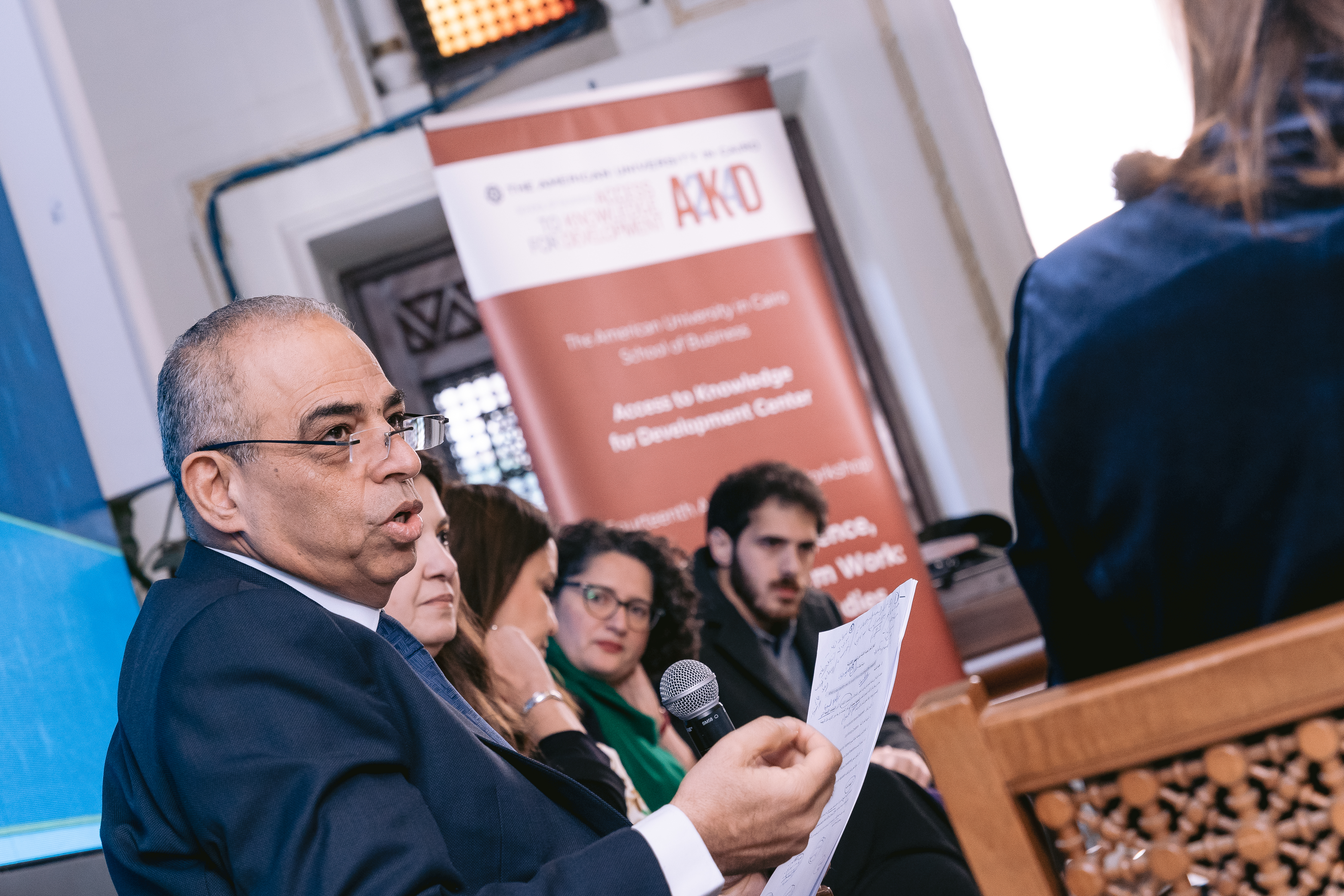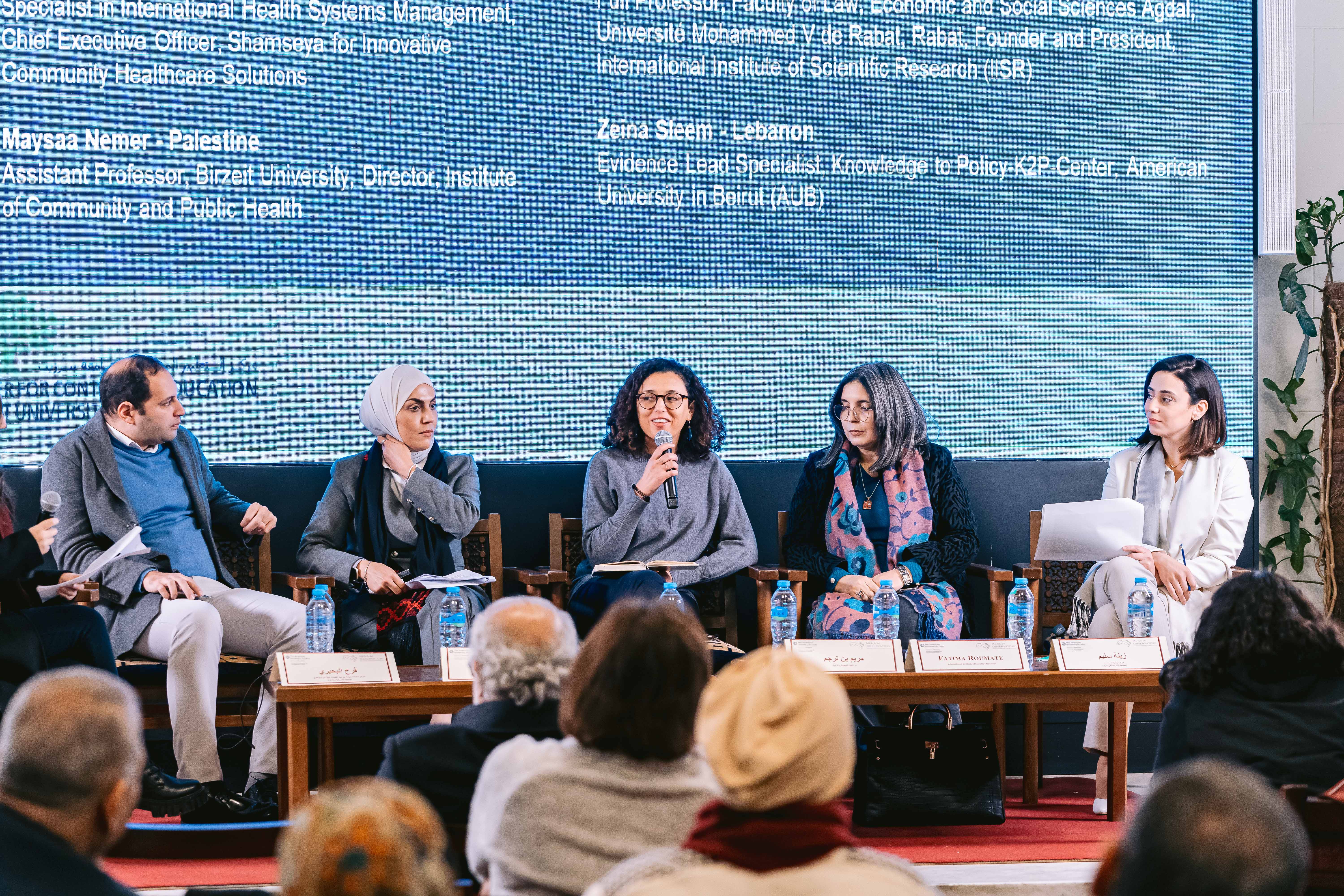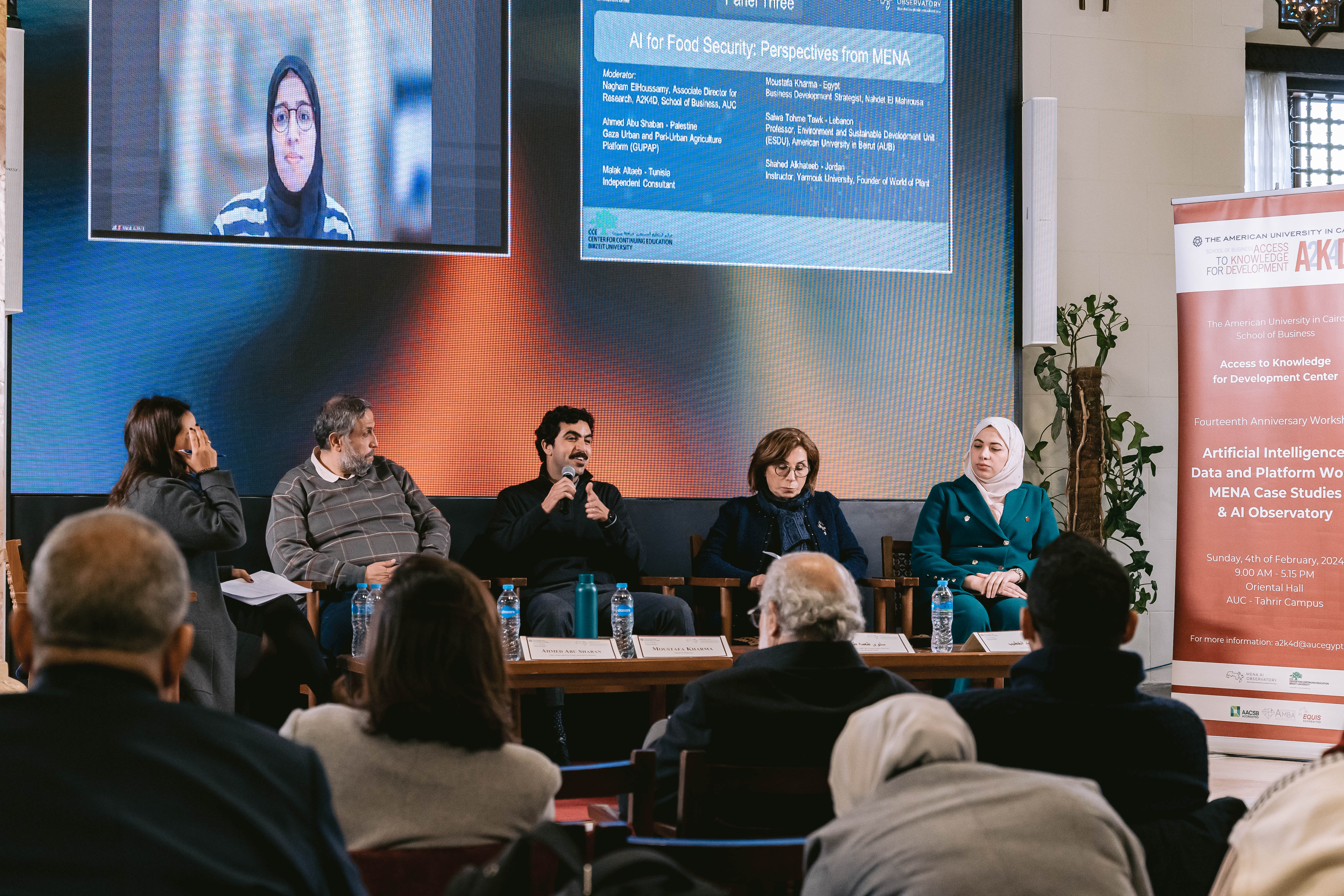Overview: A2K4D’s Fourteenth Anniversary Workshop
2024-02-29
2024-02-29
A major technological transformation is taking place at the heart of the Middle East and North Africa. Google’s "The Future of AI in the Middle East and North Africa" report predicts that the MENA region will earn $320bn by 2030 from value added by AI, as well as experiencing an annual growth of up to 20-34% in economic contribution of AI across the region.
With AI becoming pervasive in several sectors in MENA including healthcare, agriculture, finance, and education, an array of challenges and opportunities present themselves to governments and stakeholders in the region. How can we implement these emerging technologies and catch up with the world responsibly with our unique needs and contexts in mind?
At the Access to Knowledge for Development Center (A2K4D), we work on exploring the role of digital technologies and innovation in promoting inclusive development, decent work standards in the platform economy and governing responsible AI and data, all with a focus on Egypt, the Arab World, and Africa. A2K4D embraces an interdisciplinary approach across all research projects and capacity building efforts and adopts a gendered lens while investigating the challenges present within the region.
On February 4, 2024, A2K4D celebrated its Fourteenth Anniversary by holding a workshop titled “Artificial Intelligence, Data and Platform Work: MENA Cases Studies & AI Observatory” at the American University in Cairo (AUC)’s Tahrir Campus. The Center welcomed project partners from across the region including Lebanon, Jordan, Morocco, Tunisia and Palestine. The workshop was also attended by A2K4D’s wide community of global partners including researchers, academics, policymakers, civil society, students and international research supporting organizations.
The workshop served as a particularly special occasion with the launch of the MENA AI Observatory, a platform the A2K4D team has been developing for the past few years to serve as a regional hub championing MENA voices. The Observatory comes within A2K4D’s project titled “Governing Responsible Artificial Intelligence and Data in the Middle East and North Africa (MENA)” in partnership with the Center for Continuing Education (CCE) at Birzeit University (BZU) with support from Canada’s International Development Research Centre (IDRC).
The MENA AI Observatory is a locally-driven platform developed with the purpose of creating a diverse regional network for different actors within the data and AI ecosystem in the MENA region to share knowledge and ideas, collaborate on related projects, and advocate for responsible AI policies. Additionally, the Observatory will provide a voice for the region in global scholarship and debates on responsible AI governance issues by creating content originating from the MENA region; and increase social awareness of responsible AI and data in the MENA region by providing accessible resources in both English and Arabic. Last but not least, the Observatory will continue to conduct baseline research on the state of responsible AI and data in the MENA region, while keeping track of emerging trends, identifying research and policy gaps, and disseminating a body of knowledge.
The soft launch version of the MENA AI Observatory is now live here.
The live recording on the workshop can be found here.
Platform Work, Data and Inclusion: MENA Case Studies
The workshop’s kick off session was titled “Platform Work, Data and Inclusion: MENA Case Studies” with A2K4D’s regional partners from our “New Work, Data, and Inclusion in the Digital Economy: A MENA Perspective” project with support from Ford Foundation. Our panelists from Egypt, Jordan, Tunisia, Lebanon and Morocco shared the specificities of platform work based on field research in their respective counties, highlighting the legal landscape, platform work conditions and policy recommendations. Panelists also discussed the context surrounding these new forms of work, especially against the backdrop of challenging economic conditions and rampant informal employment. Platform work is also usually the worker’s last resort and not the employment of choice due to few opportunities available. While provided with new work opportunities, platform workers often face a number of challenges. Field research quotes them as “living hand to mouth”. Research showed that many platform workers across the region work under difficult circumstances, whether pertaining to safety on the road, and being forced to create their own safety nets in the absence of social protection.
All of our speakers reiterated the importance of integrating workers within the national data landscapes and the legislative environment including labor law. Research also highlighted the need for the creation of a representative entity for platform workers to ensure they have fair working conditions and access to basic rights for decent work and social protection.
Despite each individual country’s specificities, MENA shares a number of commonalities in the challenges and opportunities offered to platform workers. This emphasizes the importance of a nuanced narrative to illustrate the realities on the ground in our countries.
The session is an important step in the way forward for research on decent work in the platform economy. A2K4D’s work in this area builds on earlier work within the Fairwork Network in partnership with the Oxford Internet Institute at the University of Oxford and WZB Berlin Social Science Centre. Earlier studies include Fairwork Egypt 2022: Platform Workers Amidst Egypt’s Economic Crisis, Domestic Platform Work in the Middle East and North Africa, and Fairwork Egypt 2021:Towards Decent Work in a Highly Informal Economy.

Governance of Data for AI in the Health Sector: Cases from MENA
Data is the primary input for AI, and hence, governance of responsible data is tantamount to the governance of responsible AI. The second workshop session, titled “Governance of Data for AI in the Health Sector: Cases from MENA"; included regional partners from A2K4D’s “Governing Responsible Artificial Intelligence and Data in the Middle East and North Africa (MENA)” project in partnership with the Center for Continuing Education (CCE) at Birzeit University (BZU) with support from Canada’s International Development Research Centre (IDRC). Panelists came from Egypt, Palestine, Tunisia, Lebanon and Morocco. Guided by the principles of Protecting People, Promoting Health Value, and Prioritizing Equality within the World Bank’s Health Data Governance Principles, panelists discussed the on-ground realities of data collection, storage, and usage, as well as the governance of data and AI in the healthcare sector. They provided an overview of the opportunities and challenges present in each respective country, highlighting that health data is a pressing issue globally, that is about more than just data, but it extends to much bigger issues such as sovereignty and ownership.
During the discussion, similar challenges were echoed by our panelists, including the dearth of funding, absence of a legal data governance framework, and lack of digital literacy among Health Data Governance: Universalising the benefits of health digitization, World Bank, healthcare workers. Challenges also include the continuation of paper-based analogue data collection processes, lack of digitization of previous data records, reluctance in data sharing and exchange, and the absence of adequate digital infrastructure.
In their closing statements, all panelists agreed that there is a need for a unified and digitized structure for data collection across all health facilities which would allow for easier synchronization between different health entities, as well as a clear legal framework for health data governance. Additionally, capacity building, especially nurse and doctor training, are important to ensure that medical professionals are capable of using available technologies.

AI for Food Security: Perspectives from MENA
The third and final session of the workshop, titled “AI for Food Security: Perspectives from MENA” included partners from A2K4D’s “Governing Responsible Artificial Intelligence and Data in the Middle East and North Africa (MENA)” project. Panelists came from Egypt, Palestine, Tunisia, Lebanon and Jordan. This session mapped the existing use of AI in the agriculture sector, as well as related sectors such as import/export, logistics, distribution, and retail. Our panelists examined how AI and other technologies can provide new solutions and possibilities for food security in the MENA region by highlighting opportunities and challenges.
Similar to health, our panelists found common challenges among their countries including lack of data, absence of technological awareness among farmers, gaps in infrastructure, fragmentation and lack of synergies among stakeholders, lack of financing and funding, economic challenges, and limited AI adoption.
To wrap up the session, our panelists offered several recommendations including the need for accessible AI education and training, as well as governmental regulations that enhance the adoption of digital technologies. Examples include providing subsidies, tax benefits and promoting public-private partnerships. AI specialized incubators were also suggested to provide an environment for innovation all under one roof where different stakeholders can collaborate and share cross-disciplinary knowledge to provide solutions for agricultural challenges. The agriculture sector is a multidisciplinary field that requires different stakeholders to work together to identify the sector’s key needs and challenges that need to be addressed using AI.
Our Panelist from Gaza, Ahmed Abu Shaban, sees light at the end of the tunnel, stating that “big challenges mean big opportunities for AI deployment”.

Closing Note
We at A2K4D are proud of the work that we do with our network of partners in the region and beyond, with support of AUC’s School of Business and our external donors. We look forward to the continued utilization and development of the MENA AI Observatory to become a regional platform that hosts different knowledge outputs, unpacks discourse on the responsible use of data and AI in the region, and provides accessible material for wider networks across the region and beyond.